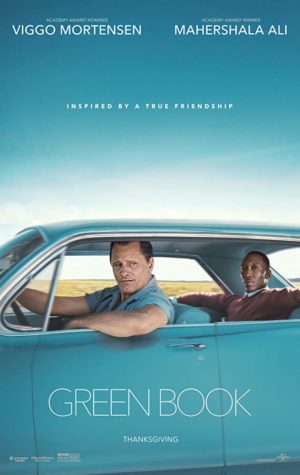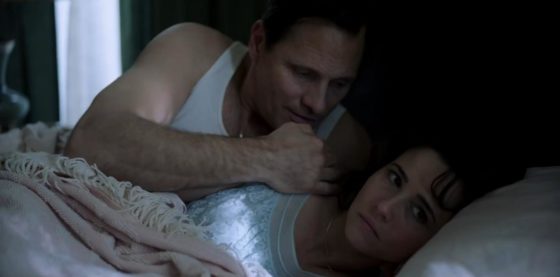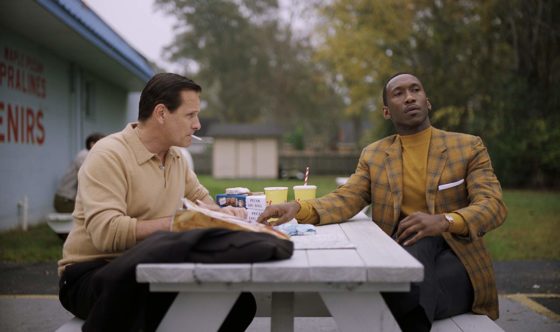

[Rating: Minor Rock Fist Up]
Road-trip movies come with certain expectations. There will be hi-jinx, challenges with surly locals that the outsiders must overcome, some sort of vehicular trouble, but most importantly – the creation of a deep, lasting bond.
Green Book, starring Viggo Mortensen and Mahershala Ali, hits every mark of the traditional road-trip movie (and a few buddy-cop movie points as well), with the added gravitas of examining racism in the 1960s in the Deep South. The story stands out due to its source material – it’s inspired by the true story of a road trip taken by musician Don Shirley and Tony Vallelonga, known as Tony Lip, a Bronx Italian with implied mob connections. In the 1960s, Shirley chose to embark on a concert tour across the South. He hired Tony Lip to drive him and handle trouble that might come up along the way.
Ali is fantastic as Dr. Don Shirley, a musical virtuoso stuck in limbo between the affluent white people he has the most in common with but who reject him for his skin color, and a desire to change minds. He plays the role with nuance and control – this man does not lose his temper, and he will not stoop to anyone’s level. Also, if they decide to add an Oscar for Best Smile (and they probably will, because Oscars), Ali’s got my vote.
The examination of race versus class is skillfully done. While Tony Lip’s white privilege can be used to advocate for Dr. Shirley – it’s only to a point. Dr. Shirley’s socioeconomic status and education serves them just as well. Green Book also shows how illogical, mean-spirited and meaningless racism is. I was unaware of “sundown” towns, for instance. And the movie really highlights how much extra work it is to exclude someone for no good reason.
The first third of the movie, before they hit the road, is rough. Viggo Mortensen is a 60-year-old Dane playing a 40-year-old Italian – and it chafes before it gets comfortable. Mortensen gives a solid Ray Liotta/Joe Pesci homage before he gets in the car and gets into the role. While Linda Cardellini is charming as Dolores, Tony’s wife, she’s obviously 25 years younger than Mortensen, and it looks really weird, even with all the hair dye he’s using.

The story was written by Nick Vallelonga, Tony’s son, and director Peter Farrelly (of those Farrelly brothers, surprisingly enough), and too much fond family remembrance seems to have gone into it. Tony Lip starts as a traditional tough guy with a case of casual, pointless racism. And he never has to face it – there’s no real moment of reckoning, he just sort of gradually changes his mind about THIS guy. But what about all the other black people?
Towards the end of the movie, Tony has no problem hanging out as the only white person in a bar full of black patrons. So why was he so annoyed about two black plumbers in his house at the beginning? Tony Lip’s journey from Italian racial slurs to hugging a black man isn’t questioned or challenged, there’s nothing he has to really overcome – and it doesn’t feel authentic next to the performances and moments that are happening. We’re supposed to assume this traditional Italian guy is also very open-minded about quite a few things all of a sudden. It doesn’t jive.

The family origins also short-change Dr. Shirley. There was so much left unfinished with him – and he was so interesting! Why was he drinking a bottle of Cutty Sark a night? Sure, the obvious reasons, but it also seemed like there was something more (perhaps due to Ali’s aloof portrayal). Did he ever get in touch with his brother? What about his love life? The screenplay leaves a big fat unanswered question there, too.
Dr. Shirley breaks down in the street because his affluence prevents him from relating to stereotypical black culture of the time, but his blackness prevents him from connecting with the white people whose circles he orbits. Does he ever find a place in this world? The writers seem to think the culmination of this trip is merely about the relationship of the two men. And while the actors have excellent chemistry and play together well, there’s more to it.
Ultimately, it’s an enjoyable film with solid acting. The dialogue is really fun, the jokes are cute and often unexpected. Shirley’s music is beautiful, and I’ve been listening to his catalog since I left the theater. Green Book’s good intentions don’t quite make up for the flimsy plot. The movie ignores the big questions it poses about identity and self-awareness, and goes for those good feels. On their journey through the South, they didn’t go quite deep enough.




Comments on this entry are closed.